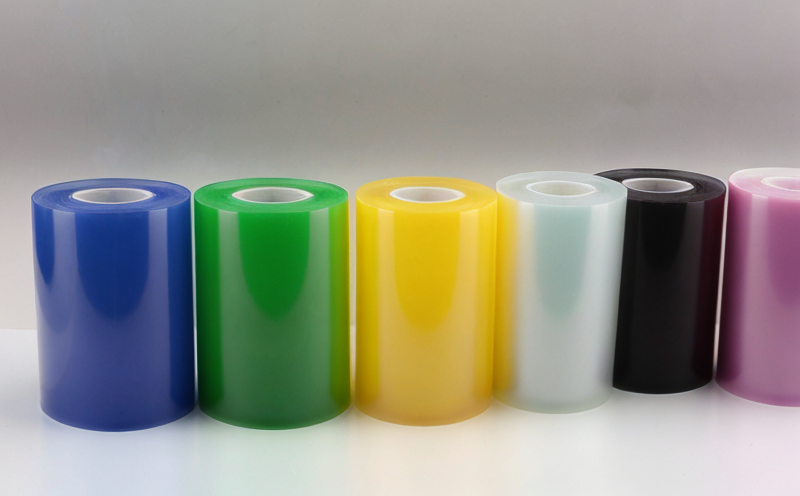DIN EN ISO 306 Vicat Softening Point Testing of Plastic Sheets
The DIN EN ISO 306 method is a standardized procedure used to determine the Vicat softening point, which represents the temperature at which a plastic sample starts to soften under load. This test is particularly relevant for plastic sheets and films in various industrial applications.
This testing process involves placing the specimen of plastic sheet or film into a heated crucible containing a specified metal rod (Vicat needle). The crucible is then placed on top of an electrically heated block. As the temperature increases, the Vicat needle gradually sinks into the sample until it makes contact with the crucible base. At this point, the temperature reading is taken as the Vicat softening point.
The DIN EN ISO 306 method provides a critical parameter for quality assurance and compliance in manufacturing processes. Understanding the Vicat softening point helps ensure that materials will perform reliably under expected operating conditions, especially in high-temperature environments.
In this testing method, it is essential to follow international standards meticulously to achieve accurate results. For instance, DIN EN ISO 306 specifies precise temperatures and heating rates for different types of plastic samples, ensuring consistency across various labs and industries.
Quality managers in manufacturing facilities often use such tests to ensure that the materials they produce meet specified quality standards. Compliance officers rely on these results to verify that their products comply with relevant regulations and industry norms. R&D engineers can also leverage this information to optimize material formulations for enhanced performance.
The testing procedure requires a well-versed technician and specific equipment such as a Vicat softening point tester, which includes a heating block, crucible, and metal rod. Specimen preparation involves cutting the plastic sheets or films into appropriate dimensions as per the standard's specifications.
Accurate temperature control is crucial for this test; deviations in temperature can lead to inaccurate readings. The heating rate must also be strictly adhered to according to the specified protocol, which ensures that the material behaves similarly under various conditions. This testing method helps in predicting the behavior of plastic materials at elevated temperatures and aids in ensuring product reliability.
The Vicat softening point is particularly important for applications where plastics are subjected to high temperatures, such as automotive components, electrical insulation materials, and construction products. It serves as a key indicator of material performance under heat stress conditions.
Industry Applications
The DIN EN ISO 306 Vicat softening point testing is widely used in multiple sectors including automotive, electrical and electronics, construction, packaging, and consumer goods. In the automotive industry, ensuring that plastic components do not deform or soften at operating temperatures is critical for safety and performance.
In the electrical and electronics sector, compliance with temperature-related standards ensures product longevity and reliability under various environmental conditions. For construction materials, this test helps in selecting appropriate plastics for applications exposed to high heat stress.
The packaging industry benefits from accurate Vicat softening point testing to ensure that packaging materials maintain their integrity during storage and handling at elevated temperatures. In consumer goods manufacturing, it aids in developing products that are safe and durable under expected use conditions.
Eurolab Advantages
At Eurolab, we pride ourselves on offering comprehensive polymer and plastics testing services. Our advanced infrastructure and experienced technical team ensure accurate, reliable results that comply with international standards.
We provide state-of-the-art Vicat softening point testing facilities equipped with precision instruments capable of maintaining exact temperature control and consistent heating rates. Our laboratories are accredited to various internationally recognized standards, ensuring the highest level of accuracy and credibility in our test outcomes.
Our team of experts is well-versed in interpreting results and providing detailed reports that include comparisons with industry benchmarks. We also offer customized testing services tailored to specific customer requirements, enhancing product development processes and improving overall quality assurance practices.
Competitive Advantage and Market Impact
The ability to accurately determine the Vicat softening point of plastic sheets using DIN EN ISO 306 is a significant differentiator for Eurolab. Our expertise in this area allows us to deliver precise, reliable data that can be used to optimize product design and improve material performance.
By ensuring compliance with international standards, we help our clients meet regulatory requirements and maintain market competitiveness. This capability also enhances brand reputation by demonstrating a commitment to quality and safety.
The insights gained from this testing method are invaluable for R&D departments in various industries. They can use the data to innovate materials and products that perform better under extreme conditions, thereby gaining a competitive edge in the market.





